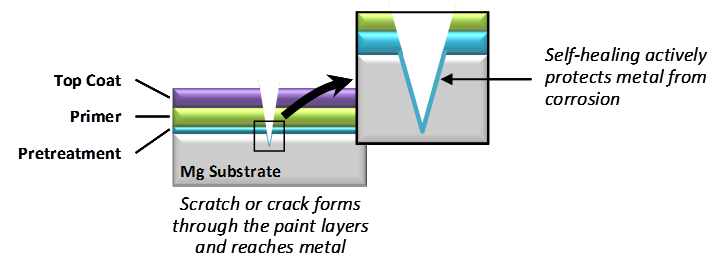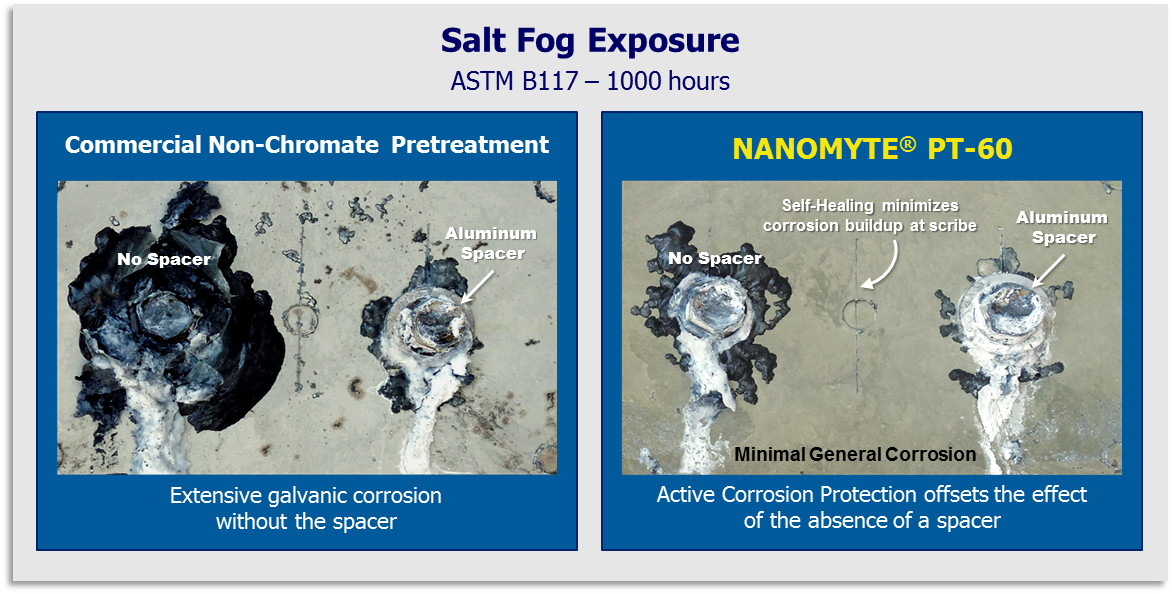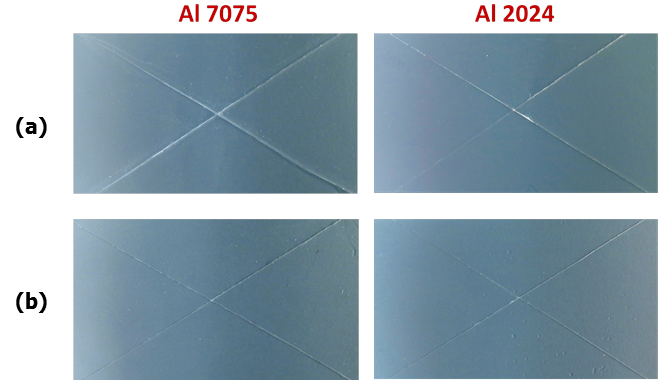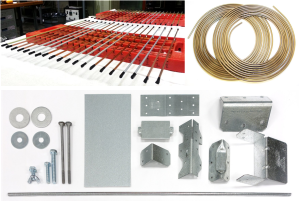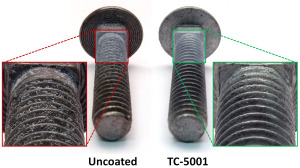NEI Coating Product Update
NANOMYTE® TC-4001-UVP Offers Protection Against Damage by UV-C Radiation Used to Disinfect Coronavirus
May 6, 2020
Somerset, NJ (USA) – NEI Corporation announced today that its newly developed NANOMYTE® TC-4001-UVP product has been shown to offer protection against damage from short-wavelength ultraviolet radiation. Ultraviolet radiation in the 100nm – 280nm wavelength range, also referred to as UV-C, is increasingly being considered as a means for disinfecting surfaces that large numbers of people are likely to come in contact with, such as parts of transit systems, theme parks, cinema theaters, public restrooms, airports, and other areas of high traffic. The COVID-19 virus has made frequent cleaning of surfaces a top priority for maintenance managers of high traffic areas. However, UV radiation causes significant damage to painted surfaces by creating free radicals that then cause polymer degradation. The NANOMYTE® coating offers protection for surfaces exposed to UV-C radiation.

NANOMYTE® TC-4001-UVP Spectroscopic Measurements
NANOMYTE® TC-4001-UVP shows remarkable ability to block UV-C, as evidenced by spectroscopic measurements shown in the adjacent figure. All radiation below 350nm is blocked completely by a film that is only 1/5 mil (5 microns) thick. The transparent coating is a single component formulation designed to protect metals and other surfaces from degrading, preserving their structural integrity and appearance. The hard, dense, and smooth coating is a composite consisting of organic and inorganic phases. It resists scratching and chipping and adheres strongly to bare, pretreated, or painted metal surfaces. A variety of other surfaces may be coated as well, such as plastics and composites. The coating is easily applied by immersion, spraying or brushing, in thicknesses ranging from microns to mils, and is available in glossy or matte finishes.
NEI’s extensive line of functional coatings, which includes NANOMYTE® TC-4001-UVP, is already in commercial use in many industrial, aerospace, consumer goods, wireless communication, and other sectors.

1000 Hours Constant UV Exposure: Polycarbonate in QUV Chamber with UVA 340 Lamps @ 0.9 W/m2
The company’s approach has been to be open and receptive to new applications brought to it by its customers. A typical interaction begins by applying the coating on the customer’s parts for evaluation. Parts are either coated at NEI’s applications laboratory or the customer procures a sample quantity of liquid coating for in-house application. The implementation process then moves through pilot scale tests and eventual qualification. NEI’s engineers support the development and qualification efforts of its customers every step of the way, including drawing up technical specifications and engaging with third party coating applicators, if necessary.
Additional Information: NANOMYTE® TC-4001-UVP Technical Data Sheet (TDS) | Safety Data Sheet (SDS)
View / Download Press Release (pdf) ↓
About NEI Corporation:
NEI is an application-driven company that utilizes materials science & chemistry to develop and produce Advanced Materials. NEI offers an array of Functional Coatings for metal and polymer surfaces. The coatings have tailored functionalities, such as Easy-to-Clean, Anti-Ice, Self-Healing, Corrosion resistant, Anti-Fog, and Abrasion Resistant.
For more information, give us a call or email us.





 Gains in productivity and efficiency are possible when a coating or surface treatment provides functionalities beyond the usual protective and aesthetic properties. This realization has sparked great interest in functional coatings in recent years for applications that traditionally have not used paints or coatings. A good example is the use of anti-ice coatings on power transmission lines. Mitigating ice accumulation will help prevent power outages, which has a tangible and beneficial economic impact. Another example is the use of a surface treatment to increase the efficiency of power generation turbines.
Gains in productivity and efficiency are possible when a coating or surface treatment provides functionalities beyond the usual protective and aesthetic properties. This realization has sparked great interest in functional coatings in recent years for applications that traditionally have not used paints or coatings. A good example is the use of anti-ice coatings on power transmission lines. Mitigating ice accumulation will help prevent power outages, which has a tangible and beneficial economic impact. Another example is the use of a surface treatment to increase the efficiency of power generation turbines.
 More often than not, many of the functionalities mentioned above need to be integrated into a single coating or surface treatment. For example, a transparent coating that resists finger printing also needs to be scratch resistant and durable. A coating that prevents fogging in eyewear and other transparent surfaces must also be durable and resistant to chemicals. Further, in order to meet the cost criteria, application of the coating must be compatible with conventional coating methods such as spray, dip, brush or flow. Over the past few years, NEI Corporation’s concerted efforts to develop and implement practical, multi-functional coatings are now coming to fruition.
More often than not, many of the functionalities mentioned above need to be integrated into a single coating or surface treatment. For example, a transparent coating that resists finger printing also needs to be scratch resistant and durable. A coating that prevents fogging in eyewear and other transparent surfaces must also be durable and resistant to chemicals. Further, in order to meet the cost criteria, application of the coating must be compatible with conventional coating methods such as spray, dip, brush or flow. Over the past few years, NEI Corporation’s concerted efforts to develop and implement practical, multi-functional coatings are now coming to fruition. Backed by a bevy of issued and pending patents, NEI has introduced an array of coating products under the registered trade name NANOMYTE®. For example,
Backed by a bevy of issued and pending patents, NEI has introduced an array of coating products under the registered trade name NANOMYTE®. For example,  Self-healing principles can also be applied to surface treatments of metals, whereby the pretreatments can mimic the performance of chromate conversion coatings. To this end, NEI has developed a series of pretreatments for different metals where a chemical self-healing mechanism imparts corrosion resistance. For example,
Self-healing principles can also be applied to surface treatments of metals, whereby the pretreatments can mimic the performance of chromate conversion coatings. To this end, NEI has developed a series of pretreatments for different metals where a chemical self-healing mechanism imparts corrosion resistance. For example,  Durable hydrophobic coatings are highly desirable for numerous applications as they usually impart easy-to-clean and stain-resisting properties to surfaces. For aesthetic reasons, there is also a need for a thin, transparent, easy-to-clean coating that does not add excess weight and does not change the appearance of the substrate to be coated. Further desirable properties of such coatings include a high degree of scratch/abrasion resistance, excellent adhesion, and chemical resistance, all of which are critical in maintaining a durable coating. In addressing these needs, NEI’s recently developed
Durable hydrophobic coatings are highly desirable for numerous applications as they usually impart easy-to-clean and stain-resisting properties to surfaces. For aesthetic reasons, there is also a need for a thin, transparent, easy-to-clean coating that does not add excess weight and does not change the appearance of the substrate to be coated. Further desirable properties of such coatings include a high degree of scratch/abrasion resistance, excellent adhesion, and chemical resistance, all of which are critical in maintaining a durable coating. In addressing these needs, NEI’s recently developed  Scratch resistance is a sought-after property for coatings in a variety of applications, such as ophthalmic and sports-wear lenses, automobile and airplane windows. Plastic substrates, such as polycarbonate and acrylic, can scratch easily and lose transparency quickly during daily use and maintenance. Hard and optically transparent coatings for plastic substrates possess a significant market potential. NEI offers a patented (US Patent 9,006,370) transparent, scratch-resistant coating called
Scratch resistance is a sought-after property for coatings in a variety of applications, such as ophthalmic and sports-wear lenses, automobile and airplane windows. Plastic substrates, such as polycarbonate and acrylic, can scratch easily and lose transparency quickly during daily use and maintenance. Hard and optically transparent coatings for plastic substrates possess a significant market potential. NEI offers a patented (US Patent 9,006,370) transparent, scratch-resistant coating called 